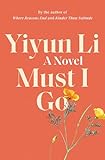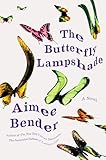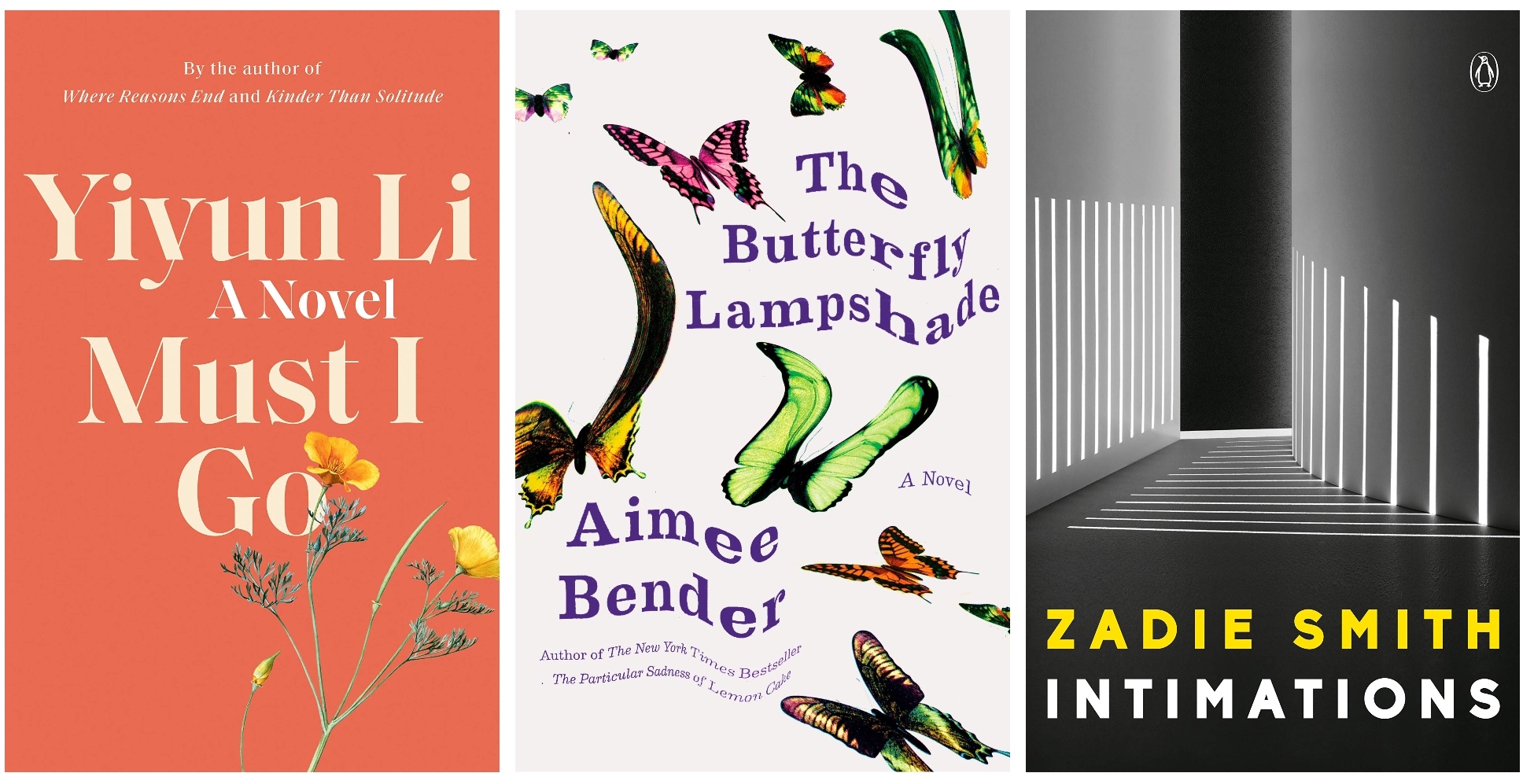Here’s a quick look at some notable books—new titles from the likes of Yiyun Li, Aimee Bender, Zadie Smith, and more—that are publishing this week.
Must I Go by Yiyun Li
 Here’s what Publishers Weekly had to say about Must I Go: “Li (Where Reasons End) writes with relentless seriousness about a woman taking stock of her past while living in a nursing home. Lilia Liska, 81, works on annotating the collected letters of Roland Bouley, a Canadian writer, and writing a personal history for her favorite granddaughter, Katherine, while most people around her have ‘droopy lids and fogged-up eyes.’ Despite Lilia’s five children and three marriages, Lilia is a solitary soul, harsh and short with family and strangers. Li presents Lilia’s notes on Bouley—whom Lilia had a brief affair with as a girl that resulted in the birth of Katherine’s mother, Lucy—and Lilia’s writings to Katherine as windows into her interior, and the meandering story is laden with tortuous doses of Lilia’s self-reflection and too-clever bon mots. Lucy’s suicide and the toll it takes on Lilia’s first marriage and Bouley’s lifelong romance with the enigmatic poet Sidelle Ogden provide the story’s emotional anchors, but more often than not, with Lilia and Bouley’s stories confined to remembrances of the past, the love, longing, and loss that they recount fails to materialize for the reader. Li adeptly captures the dreamlike, bittersweet qualities of memory, but misses the color and substance that makes that remembrance worthwhile.”
Here’s what Publishers Weekly had to say about Must I Go: “Li (Where Reasons End) writes with relentless seriousness about a woman taking stock of her past while living in a nursing home. Lilia Liska, 81, works on annotating the collected letters of Roland Bouley, a Canadian writer, and writing a personal history for her favorite granddaughter, Katherine, while most people around her have ‘droopy lids and fogged-up eyes.’ Despite Lilia’s five children and three marriages, Lilia is a solitary soul, harsh and short with family and strangers. Li presents Lilia’s notes on Bouley—whom Lilia had a brief affair with as a girl that resulted in the birth of Katherine’s mother, Lucy—and Lilia’s writings to Katherine as windows into her interior, and the meandering story is laden with tortuous doses of Lilia’s self-reflection and too-clever bon mots. Lucy’s suicide and the toll it takes on Lilia’s first marriage and Bouley’s lifelong romance with the enigmatic poet Sidelle Ogden provide the story’s emotional anchors, but more often than not, with Lilia and Bouley’s stories confined to remembrances of the past, the love, longing, and loss that they recount fails to materialize for the reader. Li adeptly captures the dreamlike, bittersweet qualities of memory, but misses the color and substance that makes that remembrance worthwhile.”
Unspeakable Acts edited by Sarah Weinman
 Here’s what Publishers Weekly had to say about Unspeakable Acts: “Weinman (The Real Lolita: The Kidnapping of Sally Horner and the Novel That Scandalized the World) provides a worthy successor to the Best American Crime Reporting annual series in this thoughtful and wide-ranging true crime anthology, which includes 13 previously published essays. The recent shift in reporting such stories from the victim’s perspective is exemplified in the deeply sad retelling of the 1966 University of Texas mass shooting, Pamela Colloff’s ‘The Reckoning: The Story of Claire Wilson.’ Wilson was seriously injured by the sniper who carried out a shooting spree from the UT Tower, killing Wilson’s boyfriend and the baby she was carrying at the time. Sarah Marshall’s disturbing ‘The End of Evil’ details her struggle to decide whether serial killer Ted Bundy should be thought of as belonging ‘to a separate species from the rest of us.’ And in an era when true crime podcasts and TV shows continue to proliferate, Alice Bolin’s ‘The Ethical Dilemma of Highbrow True Crime’ details the problems of such popular fare, which often contains unverified and potentially libelous speculations. The superior quality of these essays begs for future volumes.”
Here’s what Publishers Weekly had to say about Unspeakable Acts: “Weinman (The Real Lolita: The Kidnapping of Sally Horner and the Novel That Scandalized the World) provides a worthy successor to the Best American Crime Reporting annual series in this thoughtful and wide-ranging true crime anthology, which includes 13 previously published essays. The recent shift in reporting such stories from the victim’s perspective is exemplified in the deeply sad retelling of the 1966 University of Texas mass shooting, Pamela Colloff’s ‘The Reckoning: The Story of Claire Wilson.’ Wilson was seriously injured by the sniper who carried out a shooting spree from the UT Tower, killing Wilson’s boyfriend and the baby she was carrying at the time. Sarah Marshall’s disturbing ‘The End of Evil’ details her struggle to decide whether serial killer Ted Bundy should be thought of as belonging ‘to a separate species from the rest of us.’ And in an era when true crime podcasts and TV shows continue to proliferate, Alice Bolin’s ‘The Ethical Dilemma of Highbrow True Crime’ details the problems of such popular fare, which often contains unverified and potentially libelous speculations. The superior quality of these essays begs for future volumes.”
The Butterfly Lampshade by Aimee Bender
 Here’s what Publishers Weekly had to say about The Butterfly Lampshade: “In Bender’s astounding meditation on time, space, mental illness, and family—her first novel in a decade (after The Particular Sadness of Lemon Cake)—a 28-year-old woman works to solidify her memories from childhood. Francie is eight years old when her mother has a psychotic break and smashes her own hand with a hammer in an attempt to destroy the ‘illness that could still swerve and jag inside her.’ Francie’s aunt and uncle arrange for Francie to stay with them, and as she lays in bed at her babysitter’s house anticipating her trip, she admires a lampshade covered in butterfly prints, only to discover, upon waking, a dead butterfly floating in the glass of water beside her. Desperate to hold onto the butterfly, and to hide it from the babysitter, she swallows it. Now, 20 years later, with the help of younger cousin, Vicky, who she grew up with and is like a sister, Francie builds a ‘memory tent,’ and imagines the ‘tiny triangular empty moneyless canvas silent casino’ will restore the slippery memories of her childhood. Bender grounds the tale with observations on the ephemeral nature of moments in time (‘when it seems like words won’t bruise the moment’), as Francie harnesses a childlike perspective to explore the trauma of her mother’s breakdown. Rich in language and the magic of human consciousness, Bender’s masterpiece is one to savor.”
Here’s what Publishers Weekly had to say about The Butterfly Lampshade: “In Bender’s astounding meditation on time, space, mental illness, and family—her first novel in a decade (after The Particular Sadness of Lemon Cake)—a 28-year-old woman works to solidify her memories from childhood. Francie is eight years old when her mother has a psychotic break and smashes her own hand with a hammer in an attempt to destroy the ‘illness that could still swerve and jag inside her.’ Francie’s aunt and uncle arrange for Francie to stay with them, and as she lays in bed at her babysitter’s house anticipating her trip, she admires a lampshade covered in butterfly prints, only to discover, upon waking, a dead butterfly floating in the glass of water beside her. Desperate to hold onto the butterfly, and to hide it from the babysitter, she swallows it. Now, 20 years later, with the help of younger cousin, Vicky, who she grew up with and is like a sister, Francie builds a ‘memory tent,’ and imagines the ‘tiny triangular empty moneyless canvas silent casino’ will restore the slippery memories of her childhood. Bender grounds the tale with observations on the ephemeral nature of moments in time (‘when it seems like words won’t bruise the moment’), as Francie harnesses a childlike perspective to explore the trauma of her mother’s breakdown. Rich in language and the magic of human consciousness, Bender’s masterpiece is one to savor.”
The Island Child by Molly Aitken
 Here’s what Publishers Weekly had to say about The Island Child: “Aitken brings myth and folklore to bear in her haunting debut, a chronicle of troubled mothers and daughters set in the late 20th century. Like generations of women before her on the fictional Irish island of Inis, Oona is reared for domesticity and motherhood. As a teenager, she envies her brothers’ freedoms and is fascinated by Aislinn, a free-spirited young widow who dares to suggest women can control their own reproductive futures. Oona dreams of escape, and eventually seizes her opportunity. Years later, when her own young adult daughter disappears, Oona returns to the bleak and treeless island of her youth, where she must contend with secrets that still lie buried. Though set in the recent past in parallel chronologies, Aitken’s tale feels outside of time. The primitive nature of life on Inis reinforces the mood, as does the inclusion of folk- and fairy tale–vignettes set between chapters. Bearing overtones of Greek mythology and Celtic folklore, Oona’s story also addresses very real concerns: sexual violence, abortion, postpartum depression, and the legacy of familial trauma. Similarly, Aitken’s prose is by turns placidly lyrical, humorous, and sharply pointed, honed by women’s anger over countless generations. Bold and perceptive, Aitken’s self-assured storytelling and understanding of classic themes stand out in contemporary Irish fiction.”
Here’s what Publishers Weekly had to say about The Island Child: “Aitken brings myth and folklore to bear in her haunting debut, a chronicle of troubled mothers and daughters set in the late 20th century. Like generations of women before her on the fictional Irish island of Inis, Oona is reared for domesticity and motherhood. As a teenager, she envies her brothers’ freedoms and is fascinated by Aislinn, a free-spirited young widow who dares to suggest women can control their own reproductive futures. Oona dreams of escape, and eventually seizes her opportunity. Years later, when her own young adult daughter disappears, Oona returns to the bleak and treeless island of her youth, where she must contend with secrets that still lie buried. Though set in the recent past in parallel chronologies, Aitken’s tale feels outside of time. The primitive nature of life on Inis reinforces the mood, as does the inclusion of folk- and fairy tale–vignettes set between chapters. Bearing overtones of Greek mythology and Celtic folklore, Oona’s story also addresses very real concerns: sexual violence, abortion, postpartum depression, and the legacy of familial trauma. Similarly, Aitken’s prose is by turns placidly lyrical, humorous, and sharply pointed, honed by women’s anger over countless generations. Bold and perceptive, Aitken’s self-assured storytelling and understanding of classic themes stand out in contemporary Irish fiction.”
Florida Man by Tom Cooper
 Here’s what Publishers Weekly had to say about Florida Man: “Beach bums, wack jobs, and refugees populate Cooper’s Technicolor vision of 1980s Florida in this darkly entertaining tale (after The Marauders) set on fictional Emerald Island on the Gulf Coast. Reed Crowe has a secret, but no idea how dangerous it will prove. Two decades earlier, at 17, Reed and his soon-to-be wife, Heidi, witnessed a plane crash and found a shipment of marijuana in the burning wreckage. ‘This is going to change our life,’ Reed says. Now, proprietor of a cheesy tourist attraction called the Florida Man Mystery House and owner of the seedy Emerald Island Inn (acquired thanks to his sudden windfall from the drugs), Reed is middle-aged, often stoned or drunk, and melancholy. Reed and Heidi’s marriage has unraveled, partly because of the murky circumstances around their daughter’s death, and partly because he wanted to stay put, while she insisted on leaving for New York City to advance her art career. Wayne Wade, Crowe’s degenerate, drug-peddling childhood friend and ‘de facto factotum,’ works at the motel, but not much, and runs his mouth at local watering hole the Rum Jungle, where Henry Yahchilane, a Seminole Vietnam vet, overhears something from Wayne about a human skull sighting on a Florida Man swamp tour. After a series of violent, misunderstood encounters, Crowe and Yahchilane team up against crack-addicted Cuban refugee and assassin Hector ‘Catface’ Morales, who seeks revenge on Crowe for stealing his drugs years earlier. As Crowe manages to avoid death by snake, sinkhole, stabbing, explosion, Jet Ski, and heartbreak, he begins to know himself better, along with those around him. Throughout, Cooper’s macabre and brutal universe crackles with energy and wit, and will hold readers’ attention until the very end. Cooper’s riotous, riveting tale rivals the best of Don Winslow.”
Here’s what Publishers Weekly had to say about Florida Man: “Beach bums, wack jobs, and refugees populate Cooper’s Technicolor vision of 1980s Florida in this darkly entertaining tale (after The Marauders) set on fictional Emerald Island on the Gulf Coast. Reed Crowe has a secret, but no idea how dangerous it will prove. Two decades earlier, at 17, Reed and his soon-to-be wife, Heidi, witnessed a plane crash and found a shipment of marijuana in the burning wreckage. ‘This is going to change our life,’ Reed says. Now, proprietor of a cheesy tourist attraction called the Florida Man Mystery House and owner of the seedy Emerald Island Inn (acquired thanks to his sudden windfall from the drugs), Reed is middle-aged, often stoned or drunk, and melancholy. Reed and Heidi’s marriage has unraveled, partly because of the murky circumstances around their daughter’s death, and partly because he wanted to stay put, while she insisted on leaving for New York City to advance her art career. Wayne Wade, Crowe’s degenerate, drug-peddling childhood friend and ‘de facto factotum,’ works at the motel, but not much, and runs his mouth at local watering hole the Rum Jungle, where Henry Yahchilane, a Seminole Vietnam vet, overhears something from Wayne about a human skull sighting on a Florida Man swamp tour. After a series of violent, misunderstood encounters, Crowe and Yahchilane team up against crack-addicted Cuban refugee and assassin Hector ‘Catface’ Morales, who seeks revenge on Crowe for stealing his drugs years earlier. As Crowe manages to avoid death by snake, sinkhole, stabbing, explosion, Jet Ski, and heartbreak, he begins to know himself better, along with those around him. Throughout, Cooper’s macabre and brutal universe crackles with energy and wit, and will hold readers’ attention until the very end. Cooper’s riotous, riveting tale rivals the best of Don Winslow.”
Intimations by Zadie Smith
 Here’s what Publishers Weekly had to say about Intimations: “In this incisive and insightful collection, Smith (Grand Union) ruminates on the pandemic, racial injustice, and the writer’s role in a time of social upheaval. The collection begins with ‘Peonies,’ in which a memory of admiring flowers in a community garden sparks reflections on the female body. In ‘The American Experience,’ Smith blasts Donald Trump’s pandemic response and considers how the crisis has undermined ideas of American exceptionalism. ‘Something to Do,’ the most substantial piece, reflects on doing creative work during quarantine and how her own life of ‘executing self-conceived schedules: teaching day, reading day, writing day, repeat’ was upended by having family at home. In ‘Screengrabs,’ she briefly profiles familiar faces around her neighborhood, including a man Smith fans will recognize from a story in her Grand Union collection and a woman who is the ‘ideal city dweller’ and cultivates ‘community without overly sentimentalizing the concept.’ In a postscript to this essay, Smith skillfully demonstrates how the pandemic and police brutality constitute two sides of the same coin for Black Americans. Smith is at her perceptive and precise best in this slim but thematically weighty volume of personal and civil reckoning.”
Here’s what Publishers Weekly had to say about Intimations: “In this incisive and insightful collection, Smith (Grand Union) ruminates on the pandemic, racial injustice, and the writer’s role in a time of social upheaval. The collection begins with ‘Peonies,’ in which a memory of admiring flowers in a community garden sparks reflections on the female body. In ‘The American Experience,’ Smith blasts Donald Trump’s pandemic response and considers how the crisis has undermined ideas of American exceptionalism. ‘Something to Do,’ the most substantial piece, reflects on doing creative work during quarantine and how her own life of ‘executing self-conceived schedules: teaching day, reading day, writing day, repeat’ was upended by having family at home. In ‘Screengrabs,’ she briefly profiles familiar faces around her neighborhood, including a man Smith fans will recognize from a story in her Grand Union collection and a woman who is the ‘ideal city dweller’ and cultivates ‘community without overly sentimentalizing the concept.’ In a postscript to this essay, Smith skillfully demonstrates how the pandemic and police brutality constitute two sides of the same coin for Black Americans. Smith is at her perceptive and precise best in this slim but thematically weighty volume of personal and civil reckoning.”









